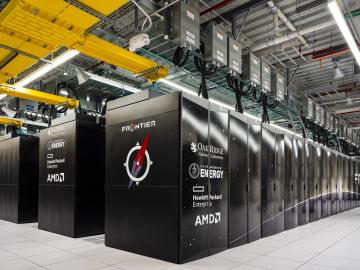
Filter News
Area of Research
- Advanced Manufacturing (1)
- Biology and Environment (17)
- Computational Biology (1)
- Computational Engineering (1)
- Computer Science (6)
- Electricity and Smart Grid (1)
- Energy Science (15)
- Functional Materials for Energy (1)
- Fusion and Fission (2)
- Materials (33)
- Materials for Computing (4)
- National Security (12)
- Neutron Science (8)
- Quantum information Science (2)
- Supercomputing (41)
News Topics
- (-) Artificial Intelligence (131)
- (-) Microscopy (56)
- 3-D Printing/Advanced Manufacturing (146)
- Advanced Reactors (40)
- Big Data (79)
- Bioenergy (112)
- Biology (128)
- Biomedical (73)
- Biotechnology (39)
- Buildings (74)
- Chemical Sciences (86)
- Clean Water (33)
- Composites (35)
- Computer Science (226)
- Coronavirus (48)
- Critical Materials (29)
- Cybersecurity (35)
- Education (5)
- Element Discovery (1)
- Emergency (4)
- Energy Storage (114)
- Environment (218)
- Exascale Computing (67)
- Fossil Energy (8)
- Frontier (64)
- Fusion (66)
- Grid (74)
- High-Performance Computing (130)
- Hydropower (12)
- Irradiation (3)
- Isotopes (62)
- ITER (9)
- Machine Learning (68)
- Materials (157)
- Materials Science (158)
- Mathematics (12)
- Mercury (12)
- Microelectronics (4)
- Molten Salt (10)
- Nanotechnology (64)
- National Security (86)
- Neutron Science (171)
- Nuclear Energy (122)
- Partnerships (68)
- Physics (69)
- Polymers (35)
- Quantum Computing (53)
- Quantum Science (92)
- Security (31)
- Simulation (65)
- Software (1)
- Space Exploration (26)
- Statistics (4)
- Summit (71)
- Transportation (103)
Media Contacts

Innovations in artificial intelligence are rapidly shaping our world, from virtual assistants and chatbots to self-driving cars and automated manufacturing.

A study led by researchers at ORNL could uncover new ways to produce more powerful, longer-lasting batteries and memory devices.

Nature-based solutions are an effective tool to combat climate change triggered by rising carbon emissions, whether it’s by clearing the skies with bio-based aviation fuels or boosting natural carbon sinks.

Andrew Lupini, a scientist and inventor at ORNL, has been elected Fellow of the Microscopy Society of America.

Researchers at ORNL have developed a machine-learning inspired software package that provides end-to-end image analysis of electron and scanning probe microscopy images.

A team of researchers from ORNL was recognized by the National Cancer Institute in March for their unique contributions in the fight against cancer.

A technology developed at ORNL and used by the U.S. Naval Information Warfare Systems Command, or NAVWAR, to test the capabilities of commercial security tools has been licensed to cybersecurity firm Penguin Mustache to create its Evasive.ai platform. The company was founded by the technology’s creator, former ORNL scientist Jared M. Smith, and his business partner, entrepreneur Brandon Bruce.

U2opia Technology, a consortium of technology and administrative executives with extensive experience in both industry and defense, has exclusively licensed two technologies from ORNL that offer a new method for advanced cybersecurity monitoring in real time.

Oak Ridge National Laboratory researchers serendipitously discovered when they automated the beam of an electron microscope to precisely drill holes in the atomically thin lattice of graphene, the drilled holes closed up.

While studying how bio-inspired materials might inform the design of next-generation computers, scientists at ORNL achieved a first-of-its-kind result that could have big implications for both edge computing and human health.


